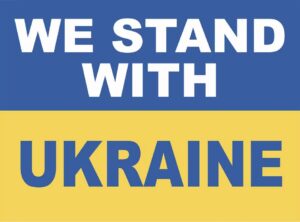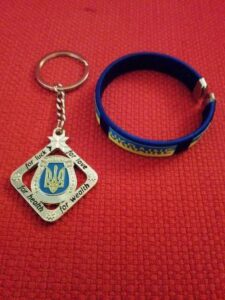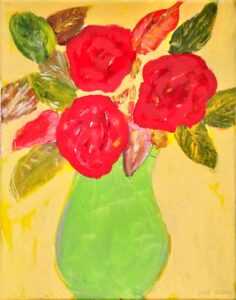It was dark by the time I arrived in the vicinity of my friend’s home. In my haste I had not looked up the address, and all the neighborhood houses, in the dusk, seemed eerily similar. But I need not have worried. There was the defiant sign in the front yard – ‘We Stand with Ukraine’. And fluttering from the porch, the distinctive yellow and blue Ukrainian flag.
 Ann met me at the door, arms outstretched, beaming a wide smile of welcome. For a recluse like me to be greeted with warm hugs and the traditional three kisses on the cheeks was a very rare occurrence. Ann’s husband, Ray, stood up in spite of his weak knees to shake my hand. “You have a strong handshake for a young man,” we both kidded each other smiling. To my great joy, Ann spoke with far greater clarity than a week ago.
Ann met me at the door, arms outstretched, beaming a wide smile of welcome. For a recluse like me to be greeted with warm hugs and the traditional three kisses on the cheeks was a very rare occurrence. Ann’s husband, Ray, stood up in spite of his weak knees to shake my hand. “You have a strong handshake for a young man,” we both kidded each other smiling. To my great joy, Ann spoke with far greater clarity than a week ago.
Our friendship began just before the onset of the pandemic nearly three years ago. Ray and Ann had visited my church for an event. In the crowd of parishioners and visitors the three of us had taken a shine to each other immediately. The couple invited me to their home for dinner soon after that first meeting, and Ann had surprised me with a few words of Armenian. She explained that when, as a child, she was in Germany from 1948 to 1952 with her family as displaced persons from Ukraine, their neighbors were Armenians displaced like themselves, and, as children are wont to do, they had picked up the rudiments of each other’s languages. Not to be outdone, Ray went and got his notebook and showed me proudly the most recent entry in the list of books he had read. It was the ‘For the Love of Armine,’ a novel I had written a few years prior. This was the sort of approbation that writers can only dream of.
Soon after that meeting came the pandemic, and I was unexpectedly stranded overseas for nearly a year. And with Covid still in the air, somehow, we never got to have a proper get together after that. We had kept in touch mostly through comments on each other’s Facebook posts. When business travel took me overseas again last summer, I stopped by Ann’s home with a bouquet of flowers before I left.
It was while I was in Nepal that the comments of Ann below my Facebook posts took a strange turn. Her notes became a jumble of words and letters that was difficult to decipher. A decade earlier a colleague of mine using Russian-English keyboard had touch-typed an email without checking the keyboard setting. The gibberish that came out then was not unlike the Facebook comments of Ann. “Did she use an English-Ukrainian bilingual keyboard and was there some technical problem with that keyboard?” I wondered.
It was only when I got back into the country, the day before Thanksgiving, that I came to learn the truth. The scrambled alphabets had nothing to do with bilingual keyboards. Ann had suffered a stroke in the summer while I was overseas and was left with aphasia – the inability to understand or produce spoken or written language cogently. She had to relearn the language from A, B, C and from children’s elementary school books. Though she had made good progress, she still could not articulate clearly enough. To make matters worse, she would mix-up what sounded like German or Ukrainian words as she visibly struggled to make herself understood. The frustration with the inability to communicate often increased the stress and made the condition worse. I was shattered by Ann’s aphasia and could not even begin to imagine how I would respond if this incapacity were to befall me, as language and the written word were more dear to me than almost anything else. Deadly diseases that were universally feared suddenly appeared slightly less alarming.
 Ann showed me the small card that she carried in her handbag that explained her condition to strangers who mistook her condition for dementia. Sometimes she was mistaken for an illegal alien who did not know English. The inability to express herself neither by speech nor in writing was tremendously frustrating for Ann.
Ann showed me the small card that she carried in her handbag that explained her condition to strangers who mistook her condition for dementia. Sometimes she was mistaken for an illegal alien who did not know English. The inability to express herself neither by speech nor in writing was tremendously frustrating for Ann.
When I walked in the door, she was all smiles and she hugged me and kissed me on both cheeks. Her love and affection triumphed over the demon of aphasia that she was battling. Happily, the speech disability had not impaired the culinary skills that she was renowned for. There on the dining table was a vast spread of the most delicious dishes one could dream of for the most sumptuous Thanksgiving.
After dinner Ann had several surprises for me. The first two presents were a silver Ukraine keychain and a blue Ukraine wristband. Then Ann brought out the bouquet of flowers I had given her months before. They were still in the vase and, though desiccated, had taken on a beauty of their own. The final denouement was a 11×14-inch painting on canvas of the same red roses in the vase. Ann had had painted this herself. My surprise and joy knew no bounds. When her language skills had hit a brick wall, the yearning to express herself had found a new outlet in painting. It will be the most cherished piece of art in my house, a symbol of Ukrainian tenacity and resilience.
O. Henry had come alive for me. Ann’s painting was ‘The Last Leaf’ and ‘The Gift of the Magi’ both rolled into one.



Abie jan, as always, a beautiful story from you and beautifully told. Your writing is a gift, as is, I am sure, your friendship to Ann. Thank you for sharing!
Carolyne jan, thank you for your kind comment and for reading my post. I treasure the friendships I have been blessed with, not least of all yours. Shnorhakalutyun!